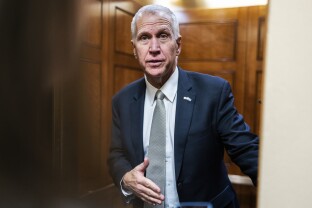Senate Republicans are wading into a growing multi-billion-dollar industry in their reconciliation bill with a new tax that’s backed by major business groups.
The Senate Finance Committee tax proposal released Monday evening includes a tax on profits from investing in litigation. Republicans normally hate raising taxes, but the provision could almost double the tax on third-party litigation earnings from 21% to nearly 41%.
“Third-party litigation funding,” or TPLF, refers to the money from someone not involved in a case — often hedge funds, foreign sovereign wealth funds, wealthy individuals and other investors, according to a 2022 Government Accountability Office report — that is invested in a lawsuit in exchange for a cut of the potential settlement or award.
In this rare fight between the corporate world and the financial industry, Congress appears to be siding with the big business interests on this provision. Of course, the reconciliation bill also includes wins for Wall Street.
“Litigation financing is fundamentally changing litigation in the US, especially injury cases brought by billboard and TV lawyers,” Mark Behrens, a co-chair of Shook Hardy & Bacon L.L.P.’s public policy group, told NOTUS in an email.
Proponents of the practice argue individuals and small- and medium-sized businesses often lack the financial firepower to go up against corporate giants and their money. Paul Kong, the executive director of the International Legal Finance Association, blasted the tax as “punitive” and warned it would “undermine access to justice in the United States.”
“The provision threatens to place significant barriers in front of small businesses, inventors, startups, and other less well-resourced claimants seeking redress,” Kong wrote in a statement to NOTUS, and added the association is “actively engaging with members of the Senate to ensure they fully understand the sweeping and harmful consequences of this funding provision.”
But those that are in favor of reining in third-party litigation funding, including business groups like the U.S. Chamber of Commerce, the American Trucking Associations and the National Association of Mutual Insurance Companies, criticize its opaque nature and characterize it as a vehicle for frivolous lawsuits. They say this kind of financing drives up the cost of litigation, opens the door to foreign actors meddling in the judicial system and eats into any recoveries a plaintiff may take away from a case.
The litigation finance industry is “largely unregulated,” wrote Behrens, who published an article last fall in the Cornell Journal of Law and Public Policy arguing for transparency into the currently undisclosed investors in litigation. He’s also testified in support of state third-party litigation funding disclosure on behalf of the U.S. Chamber Institute for Legal Reform.
“The practice raises ethical challenges for funded firms, makes cases harder and more expensive to settle, and fuels the filing of speculative cases that are often flimsy but may occasionally produce an extraordinary verdict,” Behrens wrote.
The language included in Senate Republicans’ tax proposal is similar to a bill introduced last month by Sen. Thom Tillis and Rep. Kevin Hern. The Tackling Predatory Litigation Funding Act would tax profits from third-party litigation funding at the highest individual income tax rate — which is currently 37% — plus 3.8%.
“Predatory litigation financing allows outside funders, including foreign entities, to profit off our legal system, driving up costs and delaying justice,” Tillis said in a statement last month. “This legislation will bring much-needed transparency and accountability by taxing these profits and deterring abusive practices that undermine the integrity of our courts.”
Hern said the tax “will limit unmeritorious lawsuits and provide economic relief to the middle class.”
“Truckers and consumers are both harmed when third-party financiers meddle in lawsuits to make a quick buck, which is why ATA strongly supports Senator Tillis’ provision targeting foreign entities who exploit our judicial system,” Henry Hanscom, senior vice president of legislative affairs at the American Trucking Associations, told NOTUS in an email.
“This reasonable reform would protect hardworking truck drivers and ensure justice and fairness drive accident litigation outcomes, not profits,” Hanscom added.
Spokespersons for Tillis, Hern and the U.S. Chamber did not respond to requests for comment.
Business groups, truckers, insurers and other opponents of third-party litigation endorsed a bill introduced earlier this year by Rep. Darrell Issa that would require the disclosure of currently undisclosed third-party funders.
“We think as more members see how frivolous litigation and legal system abuse costs every American household thousands of dollars every year, and TPLF is driving force behind those costs, support is likely to continue to grow,” Jimi Grande, senior vice president of federal and political affairs at NAMIC, wrote in an email to NOTUS.
Grande said NAMIC was strongly supportive of both disclosures and tax reforms impacting third-party litigation funding, and that the inclusion of the tax provision in the proposal “should also help pave the way for more focus on other solutions addressing this harmful practice.”
–
Taylor Giorno is a reporter at NOTUS.
Sign in
Log into your free account with your email. Don’t have one?
Check your email for a one-time code.
We sent a 4-digit code to . Enter the pin to confirm your account.
New code will be available in 1:00
Let’s try this again.
We encountered an error with the passcode sent to . Please reenter your email.


